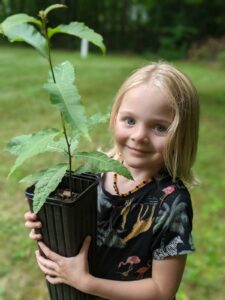For the second year, the VT/NH Chapter of The American Chestnut Foundation (TACF) will offer fertile wild-type American chestnut nuts to Chapter members (as long as supplies last). Last year, Chapter President, Doug McLane, piloted the program when 43 Chapter members participated. This year, Tom Estill will run the program from Rutland, VT with help from fellow Board member Evan Fox in Bethel, Vermont.
 This offer is free to TACF, VT/NH Chapter members. Each recipient will receive 8 to 10 nuts. If you receive this notice, but are not a TACF member, or a lapsed member, you will have to join (TACF), and thus the VT/NH Chapter, first. Go to https://tacf.org and click on membership.
This offer is free to TACF, VT/NH Chapter members. Each recipient will receive 8 to 10 nuts. If you receive this notice, but are not a TACF member, or a lapsed member, you will have to join (TACF), and thus the VT/NH Chapter, first. Go to https://tacf.org and click on membership.
Last fall, TACF volunteers gathered hundreds of fertile nuts from various chestnut trees around New England. They have been stratifying (hibernating) in refrigerators in moist peat moss all winter and will soon start to sprout. Once you receive your nuts, we will follow up with emails and videos of planting instructions and growing techniques. The nuts should be kept in moist peat in your refrigerator and should be planted outdoors in April or May. However, it would be better to pot them indoors soon after receipt and transplant the seedlings outdoors after the danger of frost. That way, you will have two-month-old seedlings to get a jump on the growing season.
Please keep in mind that these nuts, being wild type American chestnuts, are not blight tolerant. All trees grown from these nuts will be susceptible to chestnut blight. They may live for many years or only a few. However, if you develop chestnut raising skills now, you will be well positioned to plant the blight tolerant strain once it is developed and available for distribution.
Please respond by March 1st if you would like to participate in this ‘free nut’ program by emailing our chapter. Put “chestnut offering” on your email ‘subject’ line. All this will be reviewed later. As a heads-up: If your mailbox is outdoors and temps are below freezing, try to get the mailing package indoors as soon as possible and store the nuts in your refrigerator until planting. Nuts should be potted within a few days of receipt. You will want to have a supply of two-quart milk containers or deep pots and potting soil available. If you need proper size plastic pots we have a supply, so please request them.
Keep in mind that things can go wrong, this is how we learn, and if needed, more nuts will be available in the future. Above all, have fun. Jason and his daughter Elle (in photo) from Litchfield, NH had fun when they participated in the 2021 “Free Nut Offer.”
Thanks for supporting American chestnut restoration!

